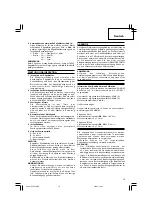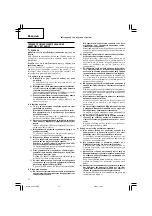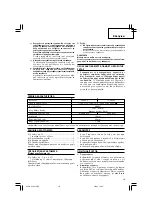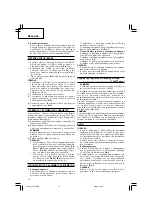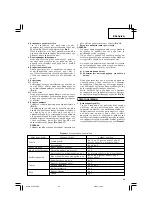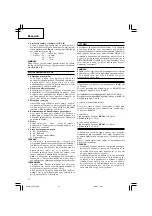
10
English
Table 1
List of Appropriate Blades
Material to be cut
Material quality
Blade No.
Lumber
General lumber
No.1 or No.31 (thick plate) or No.41 (thick
plate) or No.2 (thin plate)
Plywood
No.3 or No.6
Iron plate
Mild steel plate
No.6
Nonferrous metal
Aluminum, copper, brass
No.6
Phenol resin, melamine resin, etc.
No.4 (thick plate) or No.6 (thin plate)
Synthetic resin
Vinyl chloride, acryl resin, etc.
No.2 or No.4 (thick plate) or No.6
(thin plate)
Foamed styrol, etc.
No.2
Pulp
Cardboard, corrugated paper
No.2
Hardboard
No.5 or No.6
Fiberboard
No.6
Others
Hard rubber
No.2
Slate
No.5
SELECTION OF BLADES
1. Accessory blades
To ensure maximum operating efficiency and results
it is very important to select the appropriate blade
best suited to the type and thickness of the material
to be cut. One type of blade is provided as standard
accessory. The blade number is engraved in the
vicinity of the mounting portion of each blade. Select
appropriate blades by referring to
Table 1
.
4. Replacing supply cord
If the supply cord of Tool is damaged, the Tool must
be returned to Hitachi Authorized Service Center for
the cord to be replaced.
5. Servicing
Consult an authorized Service Agent in the event of
power tool failure.
6. Service parts list
A: Item No.
B: Code No.
C: No. Used
D: Remarks
CAUTION
Repair, modification and inspection of Hitachi Power
Tools must be carried out by an Hitachi Authorized
Service Center.
This Parts List will be helpful if presented with the
tool to the Hitachi Authorized Service Center when
requesting repair or other maintenance.
In the operation and maintenance of power tools, the
safety regulations and standards prescribed in each
country must be observed.
MODIFICATIONS
Hitachi Power Tools are constantly being improved
and modified to incorporate the latest technological
advancements.
Accordingly, some parts (i.e. code numbers and/or
design) may be changed without prior notice.
2. Acceptable commercial blades (Fig. 14)
This machine is designed to accept most blades
available on the open market. As illustrated in
Fig. 14
, blade dimension restrictions are as follows:
䡬
Thickness : L2 ..... Less than 1.6mm
䡬
Width
: L3 ..... 6.3mm
L4 ..... 8mm
L5 ..... 7mm
NOTE
When cutting thick materials, use HITACHI genuine blades
which have an inclination as shown in
Fig. 4-A
or
B
.
MAINTENANCE AND INSPECTION
1. Inspecting the blade
Continued use of a dull or damaged blade will result
in reduced cutting efficiency and may cause
overloading of the motor. Replace the blade with a
new one as soon as excessive abrasion is noted.
2. Inspecting the mounting screws
Regularly inspect all mounting screws and ensure
that they are properly tightened. Should any of the
screws be loose, retighten them immediately. Failure
to do so could result in serious hazard.
3. Maintenance of the motor
The motor unit winding is the very “heart” of the
power tool. Exercise due care to ensure the winding
does not become damaged and/or wet with oil or
water.
01Eng_CJ65V3_EE
4/8/13, 14:39
10
Содержание CJ 65S3
Страница 2: ...1 8 B 7 2 4 3 1 b a 5 4 2 1 4 6 5 9 1 2 3 0 A 0 C A 1 4 6 8 3 5 7 2 00Table_CJ65V3_EE 4 8 13 14 37 1 ...
Страница 3: ...2 G 0 A 8 A H E D F 10 12 14 9 11 13 00Table_CJ65V3_EE 4 8 13 14 37 2 ...
Страница 72: ...71 13Back_CJ65V3_EE 4 8 13 14 48 71 ...
Страница 74: ...73 1 2 3 4 5 13Back_CJ65V3_EE 4 8 13 14 48 73 ...

















